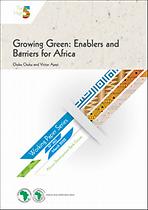
Book
Growing Green: Enablers and Barriers for Africa
Attachments [ 1 ]
More Details
Discussions about green growth transition in Africa have mostly been silent on quantifying Africa's progress and assessing countries' “green" versus “brown" growth performance. We construct a measure of Africa's green growth performance using an emissionsadjusted production technology framework that jointly accounts for the production of desirable and undesirable outputs over the period 2000-2019. We also identify the important country-level characteristics that drive green productivity growth. The computed green Malmquist-Luenberger productivity indexes penalize countries for the production of “bad” outputs and credit countries for the reduction in emissions and production of “good" outputs. Our main results indicate that Africa's productivity growth is overstated when undesirable outputs are ignored in the measurement of Africa's growth performance. Second, it is technological progress and not efficiency change—i.e., the catch-up effect—that has been the primary source of Africa's green economy transition, implying a reduction in the gap to the technological frontier for most countries. Our analysis of the drivers of green growth shows that high-income levels, tradeembodied R&D, and domestic R&D are the main enablers of green growth, while high energy intensity is the main barrier to green productivity growth. We also find evidence of nonlinearities between income level and green growth performance, consistent with the environmental Kuznets curve hypothesis. The paper ends with far-reaching policy recommendations for accelerating Africa’s green growth transition.
Comments
(Leave your comments here about this item.)